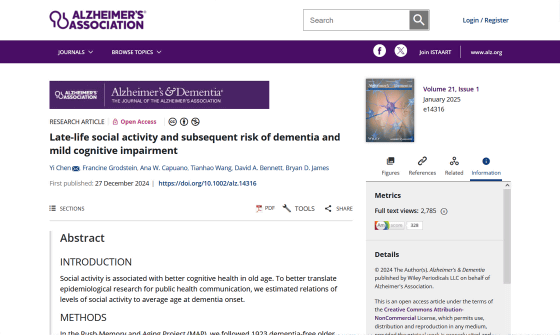Research shows that older people who regularly meet with others and attend events develop dementia more slowly

In recent years, with the declining birthrate and aging population, especially in developed countries, the increase in dementia patients due to aging has become a major issue. A new study has found that elderly people who regularly meet with family and relatives and go on trips are up to five years slower to develop dementia than less active elderly people.
Late‐life social activity and subsequent risk of dementia and mild cognitive impairment - Chen - 2025 - Alzheimer's & Dementia - Wiley Online Library

Being Social May Delay Dementia Onset by Five Years | RUSH
https://www.rush.edu/news/being-social-may-delay-dementia-onset-five-years
Your Social Life Could Help You Stave Off Dementia For Years, Study Finds : ScienceAlert
https://www.sciencealert.com/your-social-life-could-help-you-stave-off-dementia-for-years-study-finds
To investigate the relationship between social activity and dementia, a research team from Rush University in the United States analyzed data from the Rush Memory and Aging Project , a longitudinal study that followed older adults for an average of seven years. The study included 1,923 older adults, none of whom had dementia at the start of the study, with an average age of 80.
In the study, participants were asked to rate the extent to which they had engaged in various social activities in the previous year on a five-point scale: 'less than once a year,' 'several times a year,' 'several times a month,' 'several times a week,' and 'daily or almost daily.' Social activities included six types of activities: 'going to restaurants, sporting events, racetracks, etc.,' 'day trips or overnight trips,' 'unpaid community activities or volunteering,' 'visiting relatives or friends' homes,' 'participating in group activities,' and 'visiting a church or attending religious services.'
The researchers also surveyed participants to see if they had been diagnosed with dementia, and each year they were tested for memory, perceptual speed, and visuospatial ability to measure changes in cognitive function over time. None of the participants had dementia at the start of the study, but by the end of the study, 545 had developed dementia and 695 had shown signs of mild cognitive impairment.

The data showed that people in the top third of social activity were 38% less likely to develop dementia and 21% less likely to develop mild cognitive impairment during the study period compared with those in the bottom third of social activity, even after controlling for factors that explain cognitive decline, such as age, physical activity, and health.
In the graph below, the vertical axis shows the percentage of subjects who did not develop dementia, and the horizontal axis shows the age of the subjects. The blue dotted line shows the group who participated in a lot of social activities, the red dotted line shows the group who participated in a medium amount of social activities, and the black line shows the group who participated in a low amount of social activities. Overall, it can be seen that the more socially active the elderly are, the lower the incidence of dementia. According to the research team, there was a difference of about 5 years in the average age at onset of dementia between the group who participated in a lot of social activities and the group who participated in a low amount of social activities.

Although the study's findings only examined associations and did not demonstrate a direct causal relationship, co-author Brian James, an epidemiologist at Rush University, said, 'Social activities challenge older adults to participate in complex interpersonal interactions, which may promote or maintain efficient neural networks.'
in Science, Posted by log1h_ik